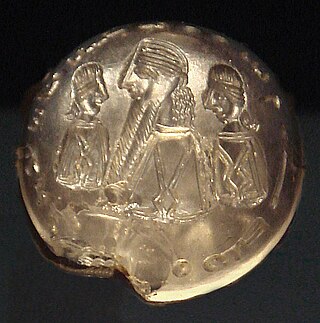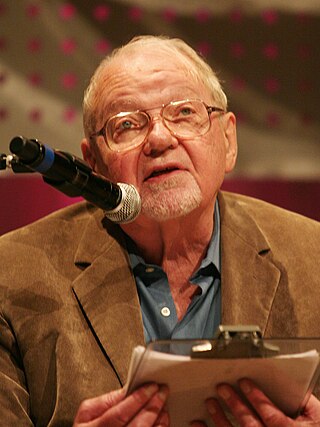
Manichaeism is a Gnostic former major world religion, founded in the 3rd century CE by the Parthian prophet Mani, in the Sasanian Empire.
Islamic studies refers to the academic study of Islam, which is analogous to related fields such as Jewish studies and Quranic studies. Islamic studies seeks to understand the past and the potential future of the Islamic world. In this multidisciplinary program, scholars from diverse areas participate and exchange ideas pertaining to the particular field of study.

Fredric Ruff Jameson was an American literary critic, philosopher and Marxist political theorist. He was best known for his analysis of contemporary cultural trends, particularly his analysis of postmodernity and capitalism. Jameson's best-known books include Postmodernism, or, The Cultural Logic of Late Capitalism (1991) and The Political Unconscious (1981).
Ibn Miskuyah, full name Abū ʿAlī Aḥmad ibn Muḥammad ibn Yaʿqūb Miskawayh al-Rāzī was a Persian chancery official of the Buyid era, and philosopher and historian from Parandak, Iran. As a Neoplatonist, his influence on Islamic philosophy is primarily in the area of ethics. He was the author of the first major Islamic work on philosophical ethics entitled the Refinement of Character, focusing on practical ethics, conduct, and the refinement of character. He separated personal ethics from the public realm, and contrasted the liberating nature of reason with the deception and temptation of nature. Miskawayh was a prominent figure in the intellectual and cultural life of his time.
Iranian philosophy or Persian philosophy can be traced back as far as to Old Iranian philosophical traditions and thoughts which originated in ancient Indo-Iranian roots and were considerably influenced by Zarathustra's teachings. According to the Oxford Dictionary of Philosophy, the chronology of the subject and science of philosophy starts with the Indo-Iranians, dating this event to 1500 BC. The Oxford dictionary also states, "Zarathustra's philosophy entered to influence Western tradition through Judaism, and therefore on Middle Platonism."
Emptiness as a human condition is a sense of generalized boredom, social alienation, nihilism and apathy. Feelings of emptiness often accompany dysthymia, depression, loneliness, anhedonia, despair, or other mental/emotional disorders, including schizoid personality disorder, post-traumatic stress disorder, attention deficit hyperactivity disorder, schizotypal personality disorder and borderline personality disorder. A sense of emptiness is also part of a natural process of grief, as resulting death of a loved one, or other significant changes. The particular meanings of "emptiness" vary with the particular context and the religious or cultural tradition in which it is used.
Postmodernist film is a classification for works that articulate the themes and ideas of postmodernism through the medium of cinema. Some of the goals of postmodernist film are to subvert the mainstream conventions of narrative structure and characterization, and to test the audience's suspension of disbelief. Typically, such films also break down the cultural divide between high and low art and often upend typical portrayals of gender, race, class, genre, and time with the goal of creating something that does not abide by traditional narrative expression.
Christopher Wise is a cultural theorist, literary critic, scholar, and translator. His publications largely focus on Sahelian West Africa, especially Mali, Burkina Faso, and Senegal, as well as Palestine, Jordan, and Israel. He has also published theoretical works on Fredric Jameson, Jacques Derrida, and Noam Chomsky.

Wael B. Hallaq is the Avalon Foundation Professor in the Humanities at Columbia University, where he has been teaching ethics, law, and political thought since 2009. He is considered a leading scholar in the field of Islamic legal studies, and has been described as one of the world's leading authorities on Islamic law.
Neoplatonism was a major influence on Christian theology throughout Late Antiquity and the Middle Ages in the East, and sometimes in the West as well. In the East, major Greek Fathers like Basil, Gregory of Nyssa and Gregory of Nazianzus were influenced by Platonism and Neoplatonism, but also Stoicism often leading towards asceticism and harsh treatment of the body, for example stylite asceticism. In the West, St. Augustine of Hippo was influenced by the early Neoplatonists Plotinus and Porphyry. Later on, in the East, the works of the Christian writer Pseudo-Dionysius the Areopagite, who was influenced by later Neoplatonists such as Proclus and Damascius, became a critical work on which Greek church fathers based their theology, like Maximus believing it was an original work of Dionysius the Areopagite.

Islamic psychology or ʿilm al-nafs, the science of the nafs, is the medical and philosophical study of the psyche from an Islamic perspective and addresses topics in psychology, neuroscience, philosophy of mind, and psychiatry as well as psychosomatic medicine. In Islam, mental health and mental illness were viewed with a holistic approach. This approach emphasized the mutual connection between maintaining adequate mental wellbeing and good physical health in an individual. People who practice Islam thought it was necessary to maintain positive mental health in order to partake in prayer and other religious obligations.

Zaki Naguib Mahmoud was an Egyptian intellectual and thinker, and is considered a pioneer in modern Arabic philosophical thought. He was described by Abbas Mahmoud al-Akkad as "the philosopher of authors and author of philosophers". Mahmoud adhered to logical positivism and adopted science interpretation with social motivations to reconcile the Arab tradition with modernism. Mahmoud defines the "Arab tradition" as the configuration of techniques by which our ancestors lived, and he viewed logical positivism as the spirit of "Modernism".

Iraqi nationalism is a form of nationalism that asserts the belief that Iraqis form a nation and promotes the cultural unity of Iraqis of different ethnoreligious groups such as Mesopotamian Arabs, Kurds, Turkmens, Assyrians, Yazidis, Mandeans, Shabaks and Yarsans.
Zakir Jabbar Bey oglu Mammadov was a correspondent member of Azerbaijan National Academy of Sciences and Doctor in Philosophy. Mammadov specialized in Eastern philosophy, and focused mostly on the history of Azerbaijani philosophy. He had refuted the thesis ‘no professional philosopher lived in Azerbaijan in Middle Ages except for Bahmanyar’.
The Budapest School was a school of thought, originally of Marxist humanism, but later of post-Marxism and dissident liberalism that emerged in Hungary in the early 1960s, belonging to so-called Hungarian New Left. Its members were students or colleagues of Georg Lukács. The school was originally oriented towards developing Lukács' later works on social ontology and aesthetics, but quickly began to challenge the paradigm of Lukácsian-Marxism, thus reconstructing contemporary critical theory. Most of the members later came to abandon Marxism. The school also critiqued the "dictatorship over needs" of the Soviet states. Most of the members were forced into exile by the pro-Soviet Hungarian government.
Hassan Abdullah Hamdan, more commonly known by his pseudonym Mahdi 'Amel, was a Lebanese Marxist philosopher, historian and militant in the second half of the 20th century.
The Cybernetic Culture Research Unit (CCRU) was an experimental cultural theorist collective formed in late 1995 at Warwick University, England and gradually separated from academia until it dissolved in 2003. It garnered reputation for its idiosyncratic and surreal "theory-fiction" which incorporated cyberpunk and Gothic horror, and its work has since had an online cult following related to the rise in popularity of accelerationism. The CCRU are strongly associated with their former leading members, Sadie Plant, Mark Fisher and Nick Land.
Middle Eastern philosophy includes the various philosophies of the Middle East regions, including the Fertile Crescent and Iran. Traditions include Ancient Egyptian philosophy, Babylonian philosophy, Christian philosophy, Jewish philosophy, Iranian/Persian philosophy, and Islamic philosophy.

Yuk Hui is a Hong Kong philosopher and Professor of Philosophy at Erasmus University Rotterdam. He is known for his writings on philosophy and technology. Hui has been described as one of the most interesting contemporary philosophers of technology.

Mental illness in ancient Rome was recognized in law as an issue of mental competence, and was diagnosed and treated in terms of ancient medical knowledge and philosophy, primarily Greek in origin, while at the same time popularly thought to have been caused by divine punishment, demonic spirits, or curses. Physicians and medical writers of the Roman world observed patients with conditions similar to anxiety disorders, mood disorders, dyslexia, schizophrenia, and speech disorders, among others, and assessed symptoms and risk factors for mood disorders as owing to alcohol abuse, aggression, and extreme emotions. It can be difficult to apply modern labels such as schizophrenia accurately to conditions described in ancient medical writings and other literature, which may for instance be referring instead to mania.








